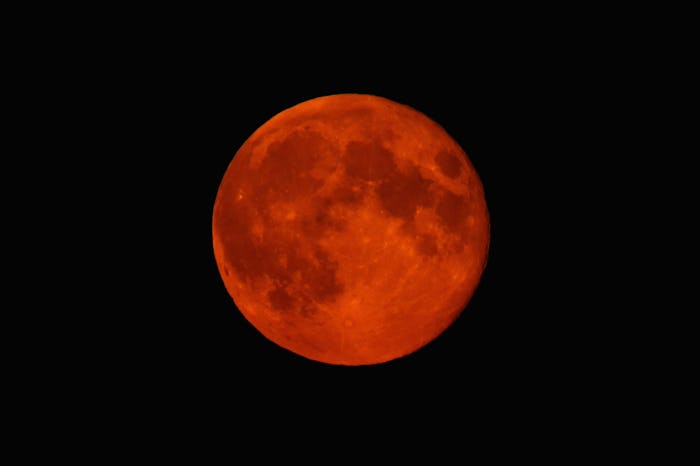Life

The Blood Moon Is On Its Way, & Here's How It Could Affect Your Kid's Behavior
My mom is a firm believer in planetary shifts being the culprit behind increased health symptoms, altered moods, and other oddball occurrences among those of us on planet Earth. Tell her you have been suffering a string of headaches or that your kid is being a regular nightmare, and she'll say, "Well, it has been a full moon..." I'm not sure how much proof there is behind the way of thinking, but then again it's sometimes hard to deny the possibility. That's why you're not wrong if you're wondering how the Blood Moon 2018 will affect your kids, because, hey, you just never know, right?
For starters, let's find our way to chatting about how the Blood Moon — which will begin overnight July 27 and into the morning on July 28 — might affect your kids by first discussing the ways in which a full moon can disrupt even the most harmonious of households. (Lunar eclipses happen when the moon is full and the Blood Moon is a lunar eclipse, so you see where I'm going with this.) According to The Weather Channel, a 2016 study from the Children's Hospital of Eastern Ontario Research Institute took a deep dive into the long-held notion that a full moon can cause disruptions in children's sleep and behavior. While researchers found the lunar activity didn't have an affect on behavior, sleep was another story. But it wasn't exactly something to write home about.
"Sleep duration was 1 percent shorter at full moon compared to new moon, while activity behaviors were not significantly associated with the lunar cycle in this global sample of children," the researchers wrote. That's about 5 minutes less sleep.
While it wasn't exactly clear why kids might get a little less shut-eye when there's a full moon, Live Science pointed out that it could have something to do with the brightness of the full moon interfering with your kid's sleep. However, the publication said researchers felt like that was a stretch given that kids are exposed to plenty of artificial light throughout the day.
But science doesn't stop people from holding steadfast in their beliefs that the moon's behavior can affect moods, feelings, and behaviors. The Mind Unleashed noted that, for example, many ancient cultures believe the lunar cycle impacts women's hormones and fertility.
"Given that full moons do impact the tides, and the human body is at least 70 percent water, maybe it makes sense that lunar eclipses could have some impact on women’s menstrual cycles or on the body’s circadian rhythm," the site noted.
In an article for ABC Science, science communicator Dr. Karl Kruszelnicki wrote that even thought the belief is unfounded by facts or proof, one survey in the United States found that about 40 percent of the general population — and 80 percent of mental health professionals — believe that the phase of the moon affects human behavior.
And astrologers are right there with those people: Astrologer Jamie Partridge described the blood moon as an "emotionally challenging eclipse," noting that Mars' fiery energy could easily translate into reckless actions. "A more gentle influence from Saturn will make it a little easier to calm down, and some fixed stars give patience and decisiveness in a crisis," Partridge wrote. "However, these same stars can also cause aggression and emotional problems."
When it comes to assessing whether or not your child will be losing their mind this weekend, it sounds like it really depends on whether you're someone who tends to lean on science or less unfounded — but possibly very real — intuition to discover your answers. Either way, we all know which way my mom will go in terms of explaining possible crazy events that occur this weekend: "It's gotta be a full moon."